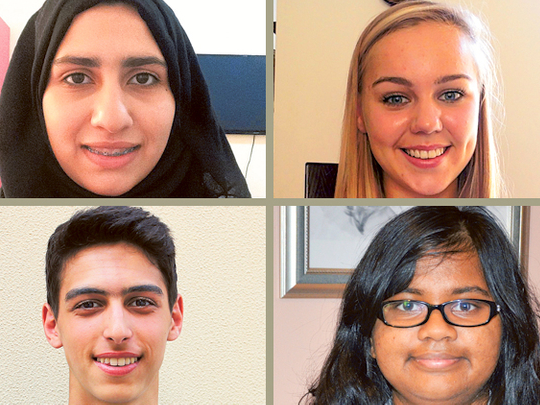
Dubai: Grade 11 students who came top in the GCSE results that were released on Thursday say parents should be aware there is a thin line between support and pressure.
Receiving good grades in the GCSE exams can determine if students will be accepted into their dream universities or not.
For this reason these exams can cause stress for students who follow the British curriculum in the UAE and their parents who want their children to receive good grades.
Students interviewed by Gulf News stressed that while parental support is instrumental in achieving high grades, they warned parents that too much ‘support’ can be overwhelming.
Indian national Pratyusha Majumder, 16, who goes to the Dubai British School and received nine A*, one A distinction and one A in the GCSE exams, said she was thankful her parents gave her space to study.
“My parents were supportive, they let me do my own studying and time planning. This is great as parents should not overdo it because it can push students over the edge and cause them to stress out, ” said Majumder.
American national Aisha Haj Salah, 16, who goes to Al Bateen Secondary School and received four As and five A*, said it was extremely important for parents not to pressure their children during the examination period.
“Sometimes during the examination period, you get really stressed to the point that you can’t get any more information into your head. So if the student’s parents force them to study they will make them not want to study at all.”
Dr Rebecca Steingiesser, clinical psychologist and clinical neuropsychologist, agreed that overinvesting in your child’s academic performance can backfire.
“There is research to suggest that in families where parents are overly invested in performance, the children are less likely to engender their own sustainable motivation and drive for personal success. Furthermore, when high expectations are established; be it explicit or not, a sense of fear of failure can be propagated, resulting in performance anxiety and subsequent academic avoidance.”
Dr Steingiesser said there is an unfortunate association between high performance expectations and depression, anxiety, alcohol and substance abuse, eating disorders, recklessness, self-harm and even suicide.”
Self-doubt
Additionally, she said research shows that most teens raised in a pressured home environment report a strong sense of emptiness and self-doubt.
Jordanian Saif Al Wadi, 16, who attends Al Bateen Secondary School and received six A*, three As and one B, said his parents gave him support only when needed, which he believes helped him get good grades.
“My parents were very supportive. They would help me whenever I was going through a rough patch. They were there when I needed them and for that I am grateful.”
German Rhea Behrends, 16, who attends Dubai British School received six A* and four As. She agreed that her parents giving her support when needed and space when needed was essential to her success.
“My parents asked me if I needed anything but they did not pressure me. This is important because the exams cause enough pressure as it is.”
David Hutson, principle of Al Bateen Secondary school in Abu Dhabi, which received a 100 per cent pass rate, advised parents to have an open dialogue with their children and provide them with the right environment and nutrition in order to excel in their studies.
“The examination period can be a very anxious time for parents and when parents worry it can add pressure on the students. Instead of doing that parents should support their child by talking to them, they should also make sure they take breaks from studying and have a wholesome meal.”












